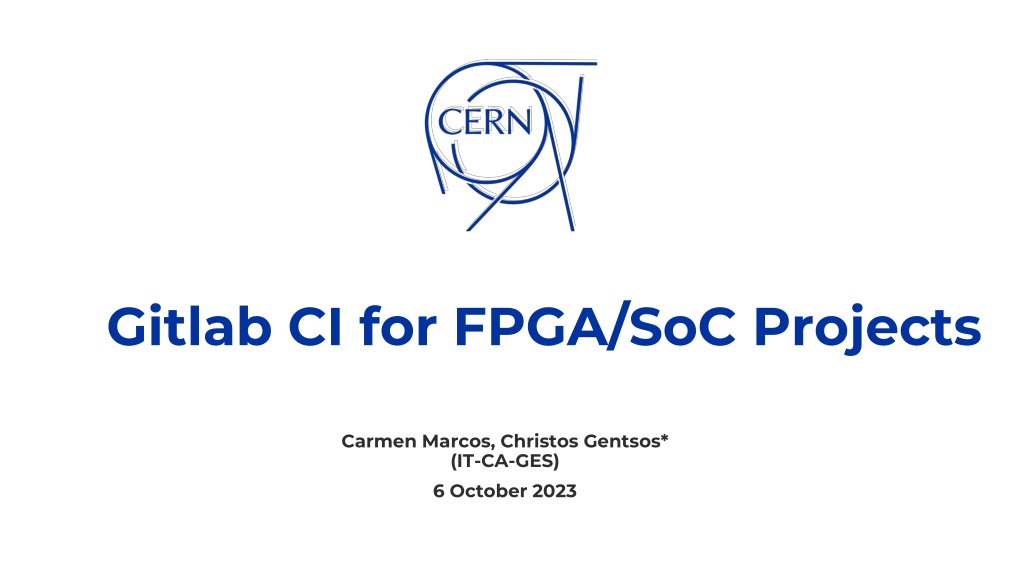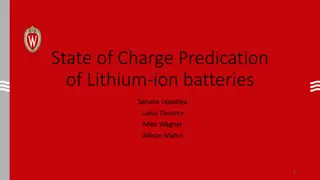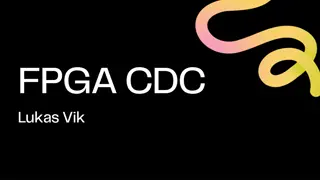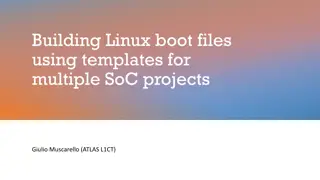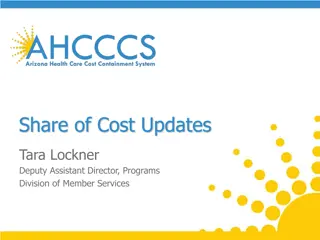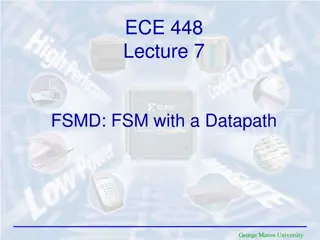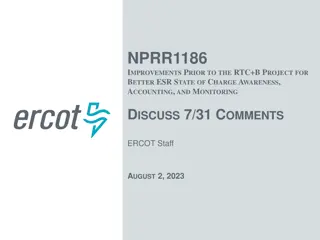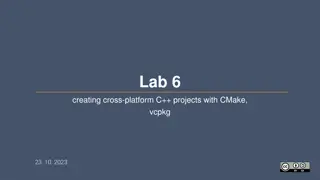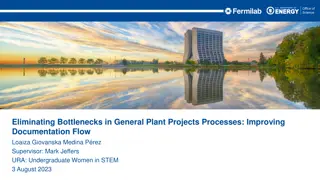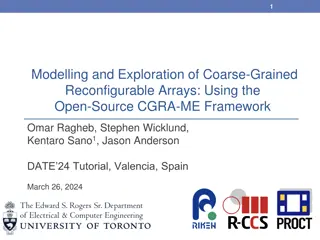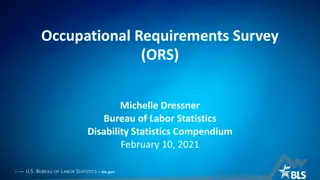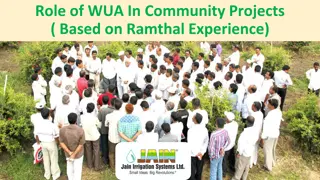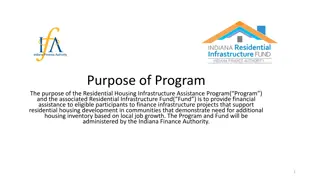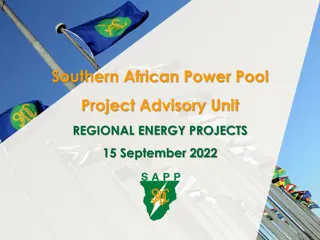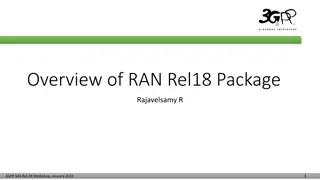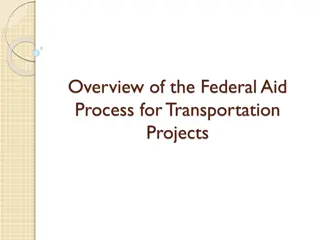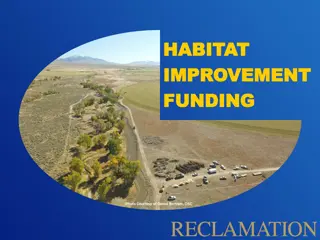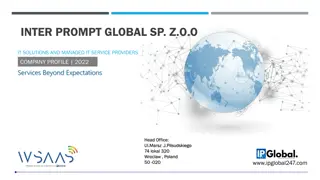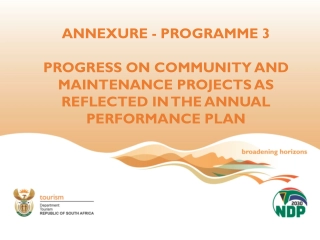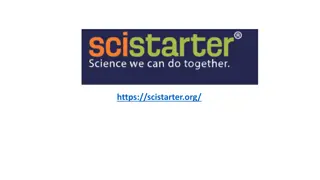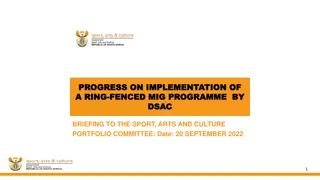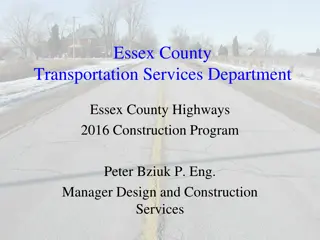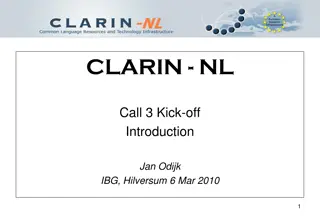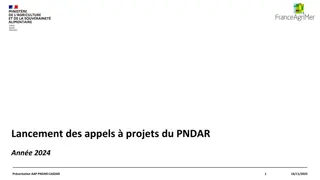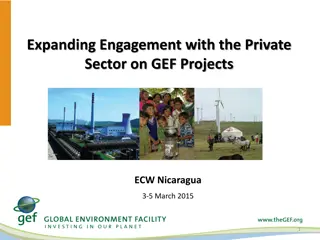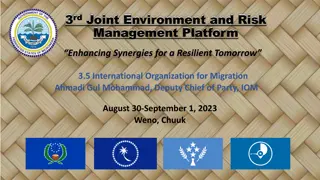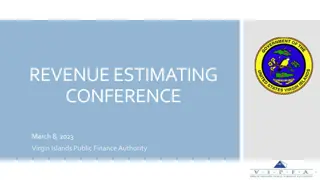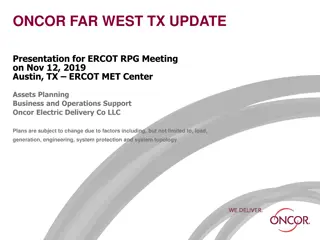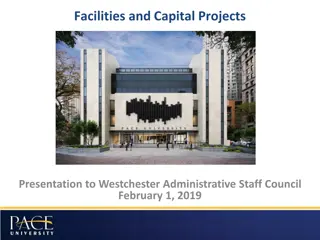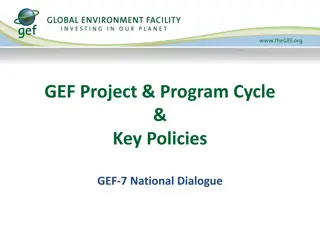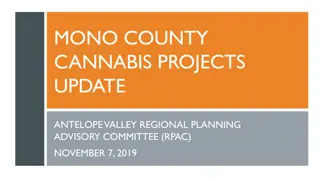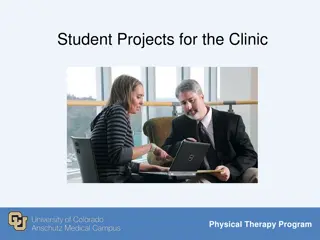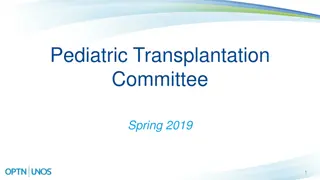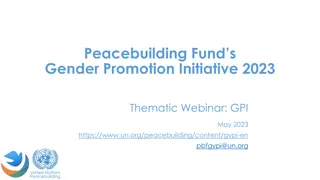Enhancing FPGA/SoC Projects with Gitlab CI: A Comprehensive Overview
Exploring the significance of Continuous Integration (CI) in FPGA/SoC projects, this presentation delves into the basics of Gitlab CI, defining CI jobs, the benefits of CI practices, project objectives, and the future plans for supporting over 100 users. The focus is on creating a scalable, VM-based CI cluster tailored to EDA tools' requirements and utilizing Docker images for enhanced efficiency, all aimed at streamlining development processes in FPGA/SoC designs.
Download Presentation

Please find below an Image/Link to download the presentation.
The content on the website is provided AS IS for your information and personal use only. It may not be sold, licensed, or shared on other websites without obtaining consent from the author. Download presentation by click this link. If you encounter any issues during the download, it is possible that the publisher has removed the file from their server.
E N D
Presentation Transcript
Gitlab CI for FPGA/SoC Projects Carmen Marcos, Christos Gentsos* (IT-CA-GES) 6 October 2023
Outline What is CI, why do we care? Project purpose and objectives Gitlab CI basics Gitlab Runners, our cluster Defining CI jobs Lazy pulling Existing images possible improvements Current state and future plans Questions? IT-CA-GES | Gitlab CI for FPGA/SoC Designs 3rd CERN System-on-Chip Workshop 6 October 2023 2
What is CI, why do we care? What is CI in FPGA/SoC Projects? Continuous Integration: first used in software development Involves regularly and automatically integrating code changes from multiple contributors into a shared codebase The term has come to be mostly used to refer to automatic testing and building at the repository level a pillar when it comes to applying CI principles Benefits: Automated and consistent system for various types of tests (unit tests, system-level tests, linting, code coverage, ) and builds (bitstream, drivers, utilities) Whole sets of jobs easy to launch used more often less breakage, easier bug- hunting on regressions Facilitates common development and code sharing (could be IP core libraries) IT-CA-GES | Gitlab CI for FPGA/SoC Designs 6 October 2023 3 3rd CERN System-on-Chip Workshop
Project purpose and Objectives Why this project? Enabling CI practices can greatly benefit FPGA/SoC design Some teams have already done considerable work to get there, but lack of centralized infrastructure is a pain: Hard to efficiently set up and (most importantly) maintain build clusters Electronics engineers are not IT even harder Huge toolchains (O(100GB) for toolchains) don t make it any easier, either Effort multiplied across all the different teams, very inefficient at scale Our objectives: Scalable, maintained VM-based cluster to run the CI jobs, adapted to the resource requirements of EDA tools (IT-PW) Easy to use Docker images for EDA tools, like simulators and toolchains (IT-CA) Document the above clearly to support the 100+ projected users IT-CA-GES | Gitlab CI for FPGA/SoC Designs 6 October 2023 4 3rd CERN System-on-Chip Workshop
Gitlab CI basics Code changed often sometimes changes reach the main branch many times/day Each change can introduce a bug, especially when touching fundamental building blocks in complex systems Ideally one should run a full test suite and build after each change to the main branch (or on a schedule nightly, for example) Gitlab CI gives tools to do exactly that Pipeline can be started after each push or merge request A pipeline can bundle many jobs together: tests, builds, doc generation One can also test or even deploy on real HW (out of scope) IT-CA-GES | Gitlab CI for FPGA/SoC Designs 6 October 2023 5 3rd CERN System-on-Chip Workshop
Gitlab Runners, our cluster A runner is a computer (or a k8s cluster) that will execute CI jobs from a pipeline It can be either private, registered to a project/group; or instance (shared), visible to all projects A runner is assigned one or more tags, depending on its purpose / capabilities (e.g. can be fpga-small or fpga-bigmem in our cluster) The cluster that we will deploy will mainly consist of (20-30?) instances with 29GB RAM, 16VCPUs, 160GB SSD fine for most tasks We can get quota for a few machines of double that size (60GB RAM) We can request quota for more machines if we see that we need it easy to scale up or down IT-CA-GES | Gitlab CI for FPGA/SoC Designs 6 October 2023 6 3rd CERN System-on-Chip Workshop
Defining CI jobs In a special file (.gitlab-ci.yml) we can declare the stages and jobs that make up a pipeline For each job, we assign a runner tag and a docker image name (e.g. fpga-bigmem and registry.cern.ch/vivado:2023.1), the commands to be ran and any resulting files to be kept The right runner type will be instantiated based on the tag, downloading the docker image and running the specified commands If all goes well, the resulting files can be found on the gitlab web page stages: - test test-job: stage: test tags: - fpga-mid image: registry.cern.ch/ci4fpga/vivado:2022.2 script: - vivado -mode batch -source build.tcl artifacts: paths: - "*.rpt" - "*.bit" IT-CA-GES | Gitlab CI for FPGA/SoC Designs 6 October 2023 7 3rd CERN System-on-Chip Workshop
Lazy Pulling To pull the image can be one of the most time-consuming steps in the container lifecycle but in many cases only a small part of the pulled data is ever read Imagine a case of an FPGA toolchain installation, full of 10s of GBs of device data for all families but we only need one family in a run! Lazy pulling allows a container to be started with just the necessary data pulled 100GB image as an example: 15 secs vs 15 minutes (with a 1Gbps connection) eStargz format, allows chunks of data to be fetched on-demand IT-CA-GES | Gitlab CI for FPGA/SoC Designs 6 October 2023 8 3rd CERN System-on-Chip Workshop
Existing Images Toolchains Simulators Others Xilinx ISE 14.7 Aldec Riviera-Pro 2021.04 2022.10 2023.04 More to be added... OpenOCD (Ubuntu) Doxygen Xilinx Vivado 2018.1 2018.3 2019.1 2019.2 2021.1 2021.2 2022.1 2022.2 Typhoon HIL Mentor ModelSim 10.7a PetaLinux 2018.1 2019.2 2021.1 2021.2 2022.1 2022.2 Mentor Questasim 2022.1 Ghdl Microsemi Libero 11.9 Intel Quartus Prime 20.1 IT-CA-GES | Gitlab CI for FPGA/SoC Designs 6 October 2023 9 3rd CERN System-on-Chip Workshop
Possible improvements Adoption of lazy pulling is only one of those We can adapt the images to run the tools as the user that launched the job This can enable us to use Europractice licenses with CI (not possible today) We can consider implementing license checks that run on container startup to avoid CI hogging licenses when humans need them Richer images (we don t care about making the image larger because of lazy pulling) Pre-compiled libraries for multiple releases of each vendor toolchain Possibility to have tools like embedded compilers etc pre-installed Consistent images open up the possibility of the community sharing and collaborating on common, base build recipes that might be used across multiple projects and teams IT-CA-GES | Gitlab CI for FPGA/SoC Designs 6 October 2023 10 3rd CERN System-on-Chip Workshop
Current state and future plans Still a work in-progress Most of the Dockerfile adaptation needed to utilize lazy pulling is complete The staging cluster has been used to implement small projects, very fast (around 3 minutes to bring up a new VM, transfer the necessary parts of the otherwise huge Vivado, and generate a bitstream) Beta-testing by ATS and EP users at the end of 2023 will be available as proof of concept Expected Outcome: Assist common development and code sharing Eliminate technical burden of creating and maintaining the necessary infrastructure Provide and maintain the simulation and synthesis tools and their licensing configuration Make all this available to both accelerators and the experiments IT-CA-GES | Gitlab CI for FPGA/SoC Designs 6 October 2023 11 3rd CERN System-on-Chip Workshop
Current state and future plans Please feel free to join the ci4fpga-beta e-group to get informed when the beta is available! IT-CA-GES | Gitlab CI for FPGA/SoC Designs 6 October 2023 12 3rd CERN System-on-Chip Workshop
Many thanks! Any questions?
